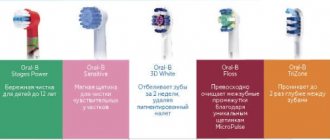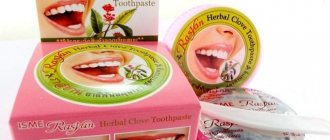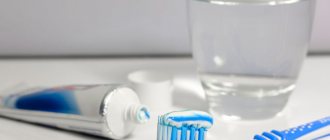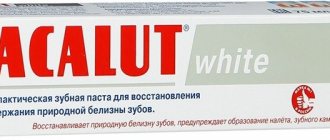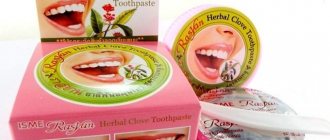Toothpaste can safely be called an essential item: it is the basis of self-care. But how to choose the right oral care product and which products to choose? We have compiled a rating of the best of them, based on reviews of real customers, personal sales statistics of KrasotkaPro and open data from the Yandex search engine.
The criteria by which we evaluate toothpastes of each brand:
- Cleansing.
After all, this is the main task of toothpaste. - Perform additional functions.
There can be many such functions: whitening, strengthening gums, enamel, etc. - Compound.
It should definitely be safe. The more natural ingredients it contains, the better. - Taste and smell.
They should be pleasant and not cause discomfort. - Texture.
It should be medium, not too thick and definitely not runny. - Comfort to use.
The paste should not bake or burn the oral cavity. - Price.
Of course, it's always nice to save money, but we are looking for the best price-quality ratio.
The rating of toothpastes is formed thanks to a system of points that we awarded to each brand for its product.
By quality:
- 1 point for effectiveness: giving teeth cleanliness and a feeling of freshness;
- 0.5 points for each additional function;
- 1 point for good composition;
- 1 point for pleasant or neutral taste and smell;
- 1 point for optimal consistency: not too thick and not too thin;
- 1 point for ease of use: there should be no discomfort.
By cost:
- 4 points for costs up to 100 rubles;
- 3 points for a cost from 100 to 250 rubles;
- 2 points for a price from 250 to 400 rubles;
- 1 point for a price over 400 rubles.
By popularity:
- 6 points for more than 30,000 queries in Yandex per month;
- 5 points for 24,000-30,000 queries in Yandex per month;
- 4 points for 18,000-24,000 queries in Yandex per month;
- 3 points for 12,000-18,000 queries in Yandex per month;
- 2 points for 6,000-12,000 queries in Yandex per month;
- 1 point for less than 6,000 queries in Yandex per month.
It was the number of all points scored that determined the place of each product in the ranking; all this is reflected in the final table. In the meantime, learn more about each product.
What components should not be there - recommendations for selection
A good oral care product should not only be effective, but also safe. Some manufacturers saturate their products with components, a high concentration of which can cause serious harm to human health in general. When choosing, pay attention to the composition - it is advisable that it does not contain the following components:
- propylene glycol - used as a solvent, including in the production of antifreeze and brake fluid. It has the properties of accumulating in the liver and kidneys, and also contributes to the gradual destruction of cellular proteins,
- Triclosan is a fairly powerful antibiotic that effectively fights pathogenic microflora, but can negatively affect the condition of the kidneys, lungs and digestive organs. The presence of this component requires prior consultation with a specialist,
- parabens are preservatives that can significantly extend the shelf life of the product. However, these substances accumulate in the endocrine glands and can provoke the development of malignant neoplasms. Allowed only in minimal concentrations,
- polyphosphates - used to soften water and stabilize reactions, therefore they are often present in washing powders. When they freely penetrate the body, they increase cholesterol levels and contribute to the development of inflammatory processes.
And these are not all dangerous substances, but they are the ones most often added to increase efficiency and improve cleaning properties. If you have some problems with your teeth or gums, it is best to consult your dentist first. Only a specialist can correctly assess the condition of the enamel and mucous membranes, and then offer the best option for your specific case.
Watch the video “How to choose a toothpaste”
- Kuryakina N.V., Savelyeva N.A. Preventive dentistry, 2003.
Recommendations from BioKot for choosing toothpaste
Choosing the right toothpaste is the key to oral health. It’s difficult to say unequivocally which toothpaste is better - everything is individual.
Despite the fact that toothpaste helps cleanse tooth enamel, it is useless without a properly selected brush. Therefore, it is worth approaching its choice just as responsibly.
We have put together several recommendations to help you make the right choice:
- No matter how good the toothpaste is, it is better to go to the dentist and consult before buying. He will examine the condition of your gums and teeth and recommend a toothpaste that is right for you.
- Don't skimp on this product. It must be remembered that treatment and restoration of teeth is a very expensive business. It's better to spend a little more money on protection and prevention than on painful treatments.
- If the family has a child under 14 years old, it is recommended to choose antianginal toothpaste or buy a separate one for children.
- Do not overuse bleaching agents. Low-quality whitening toothpastes can wear away tooth enamel.
- It is not necessary to give preference to famous brands; it is important to look at the composition. Some manufacturers lure customers with advertising, but in reality there is nothing useful in their product.
With whitening against caries
SPLAT Professional Biocalcium
pros
- Big tube
- Cleans well
- No discomfort when cleaning
- Refreshes
Minuses
- Not everyone will like the minty flavor.
From 54 ₽
The top of the toothpastes opens with a complex product with eggshell calcis. Well restores damaged enamel and reduces tooth sensitivity. Special components in the composition effectively break down plaque, keeping your breath fresh for a long time. Other components also prevent the formation of tartar.
ROCS Active Calcium
pros
- Strengthens enamel
- Reduces sensitivity
- Feeling clean
- Instant whitening
Minuses
- Not a very pleasant taste
- Expensive
From 200 ₽
Paste containing active calcium. This calcium is quickly incorporated into the structure of the teeth, restoring their shine. And also increasing resistance to caries. Low abrasiveness makes it possible to use the composition even for those who have increased sensitivity of teeth and gums.
Dabur Meswak
pros
- Naturalness
- Suitable for children
- Can be used daily
- Cleans efficiently
- Prevents the appearance of caries
Minuses
- Price
- Fast consumption
From 160 ₽
Multifunctional composition for the whole family. Very carefully cleans teeth, removing plaque and restoring natural whiteness. Strengthens enamel, making teeth less sensitive to aggressive environments. Thanks to its natural composition and mild effect, it can be used by children.
Toothpaste composition criteria
- Containing fluoride is a good option, providing a pronounced antibacterial effect and preventing the occurrence of carious lesions. But fluoride negatively affects the condition of bone tissue, so the use of such a paste should be alternated with products that do not contain fluoride.
- Soda-containing sodium carbonate particles in dental products serve as an abrasive, which over time damages the enamel and mucous membranes of the mouth. If you need to whiten your teeth and clean them of plaque, this paste can be used, but it also needs to be alternated.
- Plant components – it’s good if the paste contains extracts of propolis, oak bark, chamomile, and pine needles. These components do not cause harm and constantly maintain the condition of soft tissues.
- The concentration of parabens is not higher than 2% - parabens are preservatives that extend the shelf life of dental products, but when their content exceeds 2%, a health hazard appears.
Classification
The choice of toothpaste can be influenced by many reasons, including: the condition of tooth enamel, oral cavity, the presence or absence of tartar, and the age of the consumer. Therefore, the classification of these products will help determine which toothpaste is best for brushing the teeth of a particular buyer:
- Hygienic pastes with a preventive effect . Such products help ensure oral hygiene, protect tooth enamel from caries and periodontal disease, and remove plaque. Suitable for those who do not experience problems with dental and oral health.
- Anti-caries toothpastes . They help cope with already developed caries and stop the destruction of enamel. Such products have the property of penetrating into the most inaccessible corners, strengthening the enamel, protecting teeth from hypersensitivity.
- Whitening pastes . The composition includes abrasive components that help get rid of old plaque. People with hypersensitive teeth should not use such products.
- Remedies for increased bleeding gums . Thanks to herbal and other medicinal components, they have a hemostatic, wound-healing, antibacterial, and anti-inflammatory effect. If the product is chosen correctly, after a month of use there is a decrease in gum bleeding, a decrease in inflammation, and a general improvement in the condition of the oral cavity.
- Products for children . Children and teenagers are recommended to brush their teeth with a gentle toothpaste. It is desirable that the composition include silicon dioxide or dicalcium phosphate, and the RDA index should not be higher than 50. It is better not to use pastes with fluoride before reaching 3 years of age.
Products for sensitive teeth
Pastes for sensitive teeth contain strontium chloride, potassium nitrate and sodium citrate - substances that block the sensitivity of nerve endings. A common component is hydroxyapatite; it is capable of creating a protective film on enamel. The pastes also contain extracts and oils of medicinal herbs, which have a beneficial effect on the condition of the gums.
Decreased tooth sensitivity develops a few days after starting to use the medicinal paste. But such products cannot be used for too long due to the fact that they do not have sufficient abrasiveness and do not remove plaque well. In addition, a constant decrease in tooth sensitivity leads to masking the symptoms of other diseases, such as caries.
At first, soft toothbrushes are used with toothpaste for sensitive teeth, but as soon as the painful sensations disappear, you need to return to a regular brush with medium bristles (medium hardness). If this is not done, plaque will begin to accumulate on the enamel.
After a treatment course with toothpaste for sensitive teeth, they switch to using remineralizing pastes.
How to choose a good toothpaste: what to look for
There are several indicators that you should pay attention to first:
- compound;
- purpose (anti-caries, whitening, for gum health, etc.);
- color;
- age restrictions.
Let's look at each of these points in more detail.
Compound
As a rule, toothpaste contains 5 types of substances:
- Abrasive substances. The most important component, because it is due to it that the tooth enamel is cleansed. These substances consist of calcium carbonate, silicon, aluminum compounds and other dioxides.
- Detergents. Thanks to detergents, the property of foaming appears. This foam helps improve teeth cleaning. But here it is worth noting that some high-quality specimens are excellent at cleaning teeth without much foaming.
- Flavors.
- Humidifiers. Thanks to humectants, a gel-like texture is achieved.
- Fluorine. Most toothpastes contain fluoride. Many scientists are still trying to prove its harmfulness, but so far they have not succeeded. If you remove this component from the composition, it will not lose anything.
Purpose
Surely many have come across the fact that the same manufacturer produces an extensive line of pastes with different purposes: to strengthen enamel, against caries, for healthy gums, whitening, etc.
If we talk about budget options, you are unlikely to feel much of a difference. But if we are talking about higher quality products, which contain elements that help achieve the declared function, then the purpose must be taken into account.
Color
Many experts argue that color also plays an important role and depends on the relationship of the ingredients:
- Green - the product is natural, but this does not mean that everyone must use it. As a rule, such pastes are used only as prescribed by the dentist. It is strictly forbidden to brush a child’s teeth with them, or do this only after consultation with a specialist.
- Red is the most optimal color, where in the ratio of natural and chemical ingredients, chemical ones are slightly inferior. This option is suitable for daily use by adults and children.
- Blue - chemical components already predominate here. It is this product that is most often presented on the mass market. Cleans perfectly and is not harmful to the body. But it is not recommended to use it for daily use; it is better to alternate with “healthier” ones.
- Black - recently gaining popularity. As a rule, they contain only chemicals that can aggressively affect the condition of the gums and tooth enamel. It is better to use no more than 2 times a week.
Age restrictions
What is suitable for adults is not always recommended for children - this also applies to toothpaste. There are several rules that will help you choose toothpaste for your child:
- The presence of abrasive components in the composition should not be allowed; they are not suitable for children’s, not yet strong enamel;
- it is better to choose gel-like pastes;
- they should be checked for the absence of fluoride - if the child is over three years old, then its presence in small doses is acceptable;
- It is best to give preference to fruit flavors, since mint can cause irritation;
- It is advisable to choose pastes that can be swallowed;
- The main cleaning components should be dicalcium phosphate and silicon.
Parents and children should not use the same toothpaste. The child should brush his teeth with baby toothpaste.
Frequently asked questions to the doctor
The best way to brush your teeth
Hello, I would like to know what is better tooth powder or toothpaste?
There is no universal product that could suit everyone. Compared to toothpaste, powder can be chosen based on the following points:
- It is more effective to remove tartar, plaque and other contaminants with a dry hygiene product. Even if the bristles of the brush are soft, the product will still cope with its task.
- Tooth powder not only whitens teeth, but also polishes them. After a few cleanings, you can notice the first result; you won’t be able to achieve this effect with paste.
- The powder strengthens tooth enamel and improves the condition of gums.
- Using the powder, you can normalize the acid-base balance in the oral cavity.
Thus, we can conclude that in many respects tooth powder is superior to toothpaste.
What helps with tartar?
Is it possible to find out which remedy is best for tartar?
The best remedy, according to many dentists, with which you can soften the stone is Belagel-R. It is used for preventive purposes, just apply the product to your teeth for a few minutes, then rinse your mouth and clean.
Which pasta is better?
Tell me, what is the best Russian toothpaste or is it better to give preference to foreign ones?
The best toothpaste made in our country is New Pearl Fluoride. It has a good whitening effect, refreshes the oral cavity, and contains a lot of calcium. The product cost is low. The only drawback that can be highlighted is that some people experience an allergic reaction after use.
Anti-caries pastes
Anti-caries pastes usually contain large amounts of calcium, fluoride and other substances that help strengthen dental hard tissues and restore their barrier functions. However, their effectiveness should not be overestimated: they only help prevent caries and, in some cases, can slightly slow down the process in the presence of carious lesions. It is impossible to cure caries or completely protect yourself from its occurrence with the help of such a paste. In addition, you need to be extremely careful about studying the composition of the paste. Too much fluoride content with prolonged use of the paste can lead to the development of fluorosis. This is especially important for residents of regions whose water contains large amounts of fluoride.
Types of toothpastes and their purposes
The range includes products for the prevention of caries, against bleeding gums, for whitening enamel and restoring the pH balance of the oral cavity - this is just a part of the possible uses. The main types are discussed below, based on their “functionality”.
Hygienic for prevention
The main purpose is to keep teeth and oral mucosa clean. They remove plaque well and freshen breath. This also includes children's ones, which act gently and usually have a pleasant taste. This is the best option for daily use if there are no obvious problems with teeth and gums.
Bleaching agents with abrasive particles
The action of whitening pastes is aimed at lightening the enamel using chemical reagents or large abrasive particles. In the first case, bleaching is the result of a chemical reaction of special enzymes, for example, pyrophosphates - they literally destroy bacterial plaque and remove pigmented spots. Abrasive particles make it possible to achieve lightening of the enamel through mechanical action. Here the RDA indicator usually exceeds 80, so they can only be used in courses, not on an ongoing basis. Otherwise, your teeth may become too sensitive.
There is a large selection of abrasive toothpastes
Gum for gentle care
They are characterized by a low content of abrasive particles - no more than 60. Suitable for people with sensitive teeth and damaged enamel. This usually includes mineral components that accumulate in the enamel and contribute to its restoration. An excellent option for cases of hyperesthesia, but only until the condition normalizes. Then you can move on to preventive measures - on the recommendation of the dentist. The fact is that dentures do not do a very good job of cleaning plaque and softening hardening deposits.
“Oh, for me, going to the dentist is almost tantamount to psychological hard labor! The result is half your mouth covered in fillings and increased sensitivity. At the last medical examination, the dentist recommended changing the toothpaste. He says it's too hard for my teeth and gums. I switched to another, gentle one. Within a couple of months, sensitivity was restored and the gums stopped bleeding. It often happens that we ourselves only make things worse, so consultation with a doctor will never be superfluous.”
Rita1985, from correspondence on the forum www.32top.ru
With anti-caries effect
When fluoride and/or calcium are added to the composition, it acquires an anti-caries effect. These components help strengthen dental tissues and prevent caries. Periodic use of such products ensures surface remineralization and increases the resistance of the enamel to the negative effects of external factors. But you shouldn’t use them on an ongoing basis - it may have the opposite effect. If the content of these substances is high, you should first consult a dentist.
Strengthening pastes may contain calcium
Anti-inflammatory action
To restore and strengthen gums, herbal ingredients are usually added. The composition also contains active substances with an antibacterial effect: the antibiotic triclosan, the antiseptic chlorhexidine and others.
The main goal is the destruction of pathogenic microflora, the removal of inflammatory processes and the restoration of soft tissues. Such pastes are usually prescribed as part of maintenance therapy in the treatment of gingivitis and periodontitis. They help in the fight against bleeding and swelling. If potent components are present in high concentrations, use can only be started after the doctor’s approval, and the course itself should last no more than three weeks in a row.
Saline against sore gums
The active components have a positive effect on the condition of the mucous membrane. Salts in high concentrations effectively reduce inflammation by ensuring the outflow of excess fluid from soft tissues, and soothe acute symptoms: pain, swelling, bleeding. Recommended for gingivitis, periodontitis and periodontal disease. Active components improve blood flow and stimulate metabolic processes. The only downside is that it has a specific taste.
Organic with natural ingredients
Products based on plant components do not contain harsh chemicals and provide gentle cleansing. Essential oils and extracts of medicinal plants must be supplemented with surfactants (surfactants) - without them, high-quality cleansing is impossible. It’s another matter if the surfactants themselves are of a plant nature, and then we can confidently call the product completely natural. This is a good choice for children, as well as adults with healthy teeth and gums. However, according to some reviews, the effectiveness of organic products is far from desired. They are not cheap and often cost a lot.
These plant-based products do not contain chemicals.


